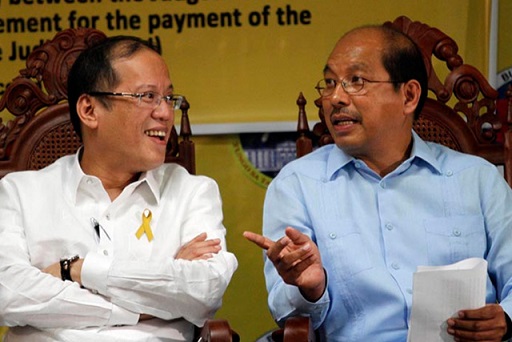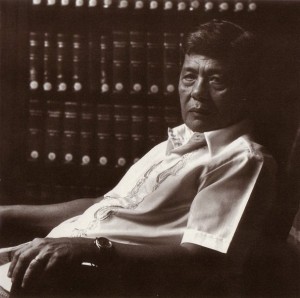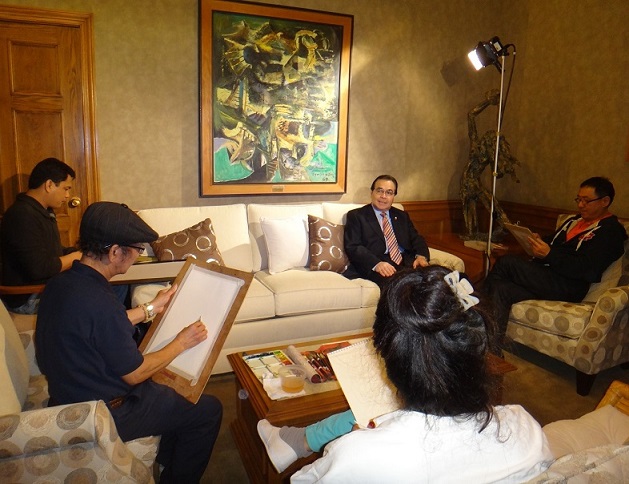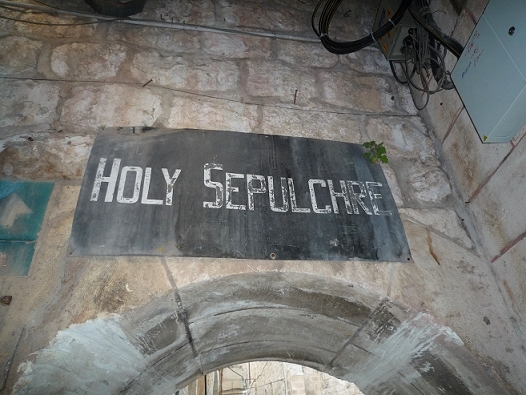Move to impeach Aquino over DAP, a legal or moral issue?

President Benigno ‘Noynoy’ Aquino (left) with DAP architect Butch Abad, who is also the Philippines’ Budget secretary
Impeachment talks abound lately, not solely confined on these shores, likewise, from our ancestral home.
The process has been bruited about during the last few days because of the Philippine Supreme Court’s decision on the Disbursement Acceleration Program (DAP).
Arguments invoke a constitutional option: “Article XI, Section 1: Public Office is a public trust. Public officers and employees must, at all times, be accountable to the people, serve them with utmost responsibility, integrity, loyalty, and efficiency; act with patriotism and justice, and lead modest lives.”
Such public officials include the President, Vice President, Associate Justices of the Supreme Court, members of the Constitutional Commissions and the Ombudsman; they may be removed from office through impeachment for culpable violation of the Constitution, treason, bribery, graft and corruption, other high crimes, or betrayal of public trust.
However, reportedly, no member of the House has endorsed either complaint, a requirement for the impeachment process against President Aquino, to commence.
That aforementioned DAP, as well-known as it has become in its infamy, consists of, according to judicial analyses: ‘aggressive, systematic transfers from slow-moving projects, to stimulate the economy while infrastructure projects were reviewed for corruption.’
Voices have been sought about the power of the legislative department: “Congress’ power to appropriate funds met the President’s power to ‘realign’ savings.
“Too much flexibility renders Congress’ role ‘useless,’ yet the budget is not intended to be a straitjacket,” was the critique on Malacanang.
Two SC associate justices, Lucas Bersamin and Estela Perlas-Bernabe have penned their say, meant to strike down the now highly denounced pork barrel that critics say now belongs to a ‘cesspool of corruption.’
The Bersamin-Bernabe decision has two main arguments:
1-Congress sets the rules for declaring savings and the DAP transfers violated these, i.e., required time periods before a project can be declared savings and the National Treasurer’s certification that revenues exceeded targets;
2-The president may realign funds only to existing projects but some DAP transfers were to completely new projects; some DAP transfers were to departments outside the executive branch, such as Congress, explicitly prohibited by the Constitution.
Another SC voice, Marvic Leonen has argued that the decision by the SC seemed to strike down the DAP as an abstract concept and there were scant concrete facts presented regarding concrete acts. In other words, he really invokes lack of ‘actual case,’ which technically says the “high court has no jurisdiction.”
From House Speaker Feliciano Belmonte: “His chamber of porkers will not allow President Aquino to be impeached.” It doesn’t matter whether an impeachment complaint succeeds or not; if the House kills the complaint, the people will see the extent of the Aquino name in Congress.
At this juncture, Congress was reported to be a major DAP beneficiary. Too, there are negative voices against Malacanang.
An eventual impeachment complaint will force the executive department, particularly the DAP architect, Budget Secretary Florencio Abad, to explain how the “billions impounded by Malacanang as forced savings from uncompleted projects and given in part to lawmakers from 2011 to 2013 were spent.”
Those voices that side with President Aquino say he is ever so popular, and that whatever comments wish to proceed with impeachment is remote.
Another opinion from a well-known educator who is well-versed in the Philippine constitution: “President Aquino keeps a firm hold on many lawmakers, who if they turn against him would be forced to admit their own part in the wrongdoing.”
What happens to the impeachment move? Is it therefore a game ruled by numbers? Is it going to be about right and wrong?
Whether to call for the President’s impeachment is a moral, not legal issue has emerged strongly. That DAP had a ‘noble end.’ That there are tangible pluses. That Aquino did not line his pockets appear irrelevant to legal issues.
Yet, what happens to the moral ones?












The President has violated the Philippine Constitution. He has Congress in his pocket.
It is time for another EDSA revolution. Isn’t it?